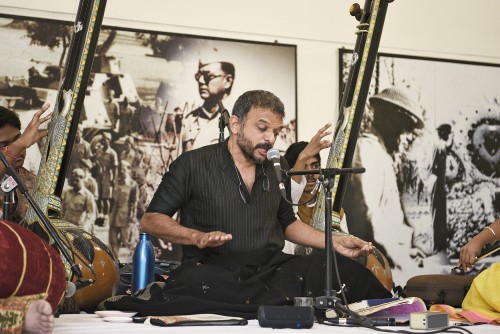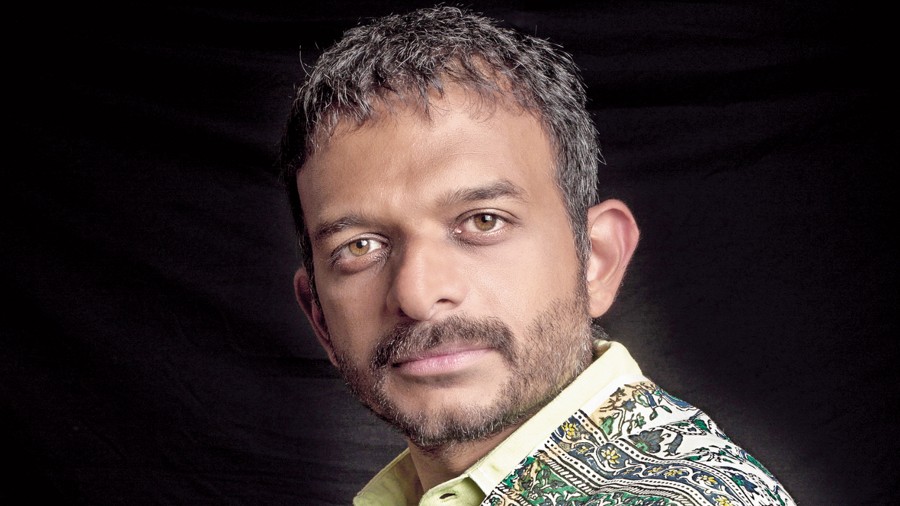Penning an introductory line summing up the accolades and achievements of Thodur Madabusi Krishna is a daunting task for his warranted aversion to classify and label one’s achievements, thereby restricting them in predetermined boxes. A Carnatic singer with the power to enthral an audience with his music, T.M. Krishna has questioned not just the concept and definition of tradition but also courted controversy by raising questions to the gatekeepers of puritanical ideas. Author, activist, advocate and singer are words casually strewn around his oeuvre but the only defining label for the Ramon Magsaysay Awardee is perhaps that of a change-maker. His last book Sebastian & Sons: A Brief History of Mrdangam Makers was path-breaking in its approach and tenor as he delved into the cruel caste hierarchies existing in the making and playing of the mridangam in Carnatic classical music. His thinking is deeply rooted in the awareness of his inadequacies and privileges, and he is undeterred by the daunting task of raising questions that he might not have answers to. Thus it is no surprise that over the span of the last few years, Krishna has written, questioned, attacked and explained his thoughts through essays that have now been collated into an eye-opening book, aptly titled The Spirit of Enquiry: Notes of Dissent (Allen Lane; Rs 599). Speaking to t2oS on a Monday morning over Zoom, Krishna let us take a peek into his argumentative mind and household that spark conversations that are inescapable in an increasingly intolerant world. From the tone-deafness of the privileged community of artistes in the face of crisis to performative allyship on social media, from the definition of art to a more socially aware generation of the future, the author spoke and we took ‘notes’!
THE EVOLUTION OF SELF
These essays span across a large time period so the evolution of his thoughts is distinctly visible. However, the refreshing change in his writing comes from his ability to question his own words and ideas when chancing upon a distinctly different school of thought. “You will see nuances being added as you go through the essays and that comes from rethinking, introspecting and new experiences,” he says, emphasising on the last bit. “I think there is movement and rejection of what I was before, sometimes. I hope it keeps moving and as long as it does, I am happy,” he trails off.
However, in India, words have repercussions that can be construed as criminal. How does one grapple with the idea of it while putting out these ‘notes of dissent’? Krishna has his privilege to thank for his lack of fear. The insulation offered to him by societal acceptance allows very little window for fear –– but a window nevertheless. That window lets in fear for his family’s well-being and begets a second look over the shoulder sometimes when being threatened by groups in cities far and wide. “There is indeed fear sometimes but I am the kind of person who believes in putting out what I feel strongly about. I am okay with facing resistance to it –– that is the least you can do with our privilege, right?!” he exclaims. His disdain for people occupying seats of privilege while also succumbing to fear is justified as it does “most injustice to people in the margins who are getting hammered while screaming themselves hoarse in an effort to be heard”.
THE NEW EMPATHETIC NORMAL
Krishna’s ‘new normal’ involves extensive work for marginalised artistes during this pandemic with help from volunteers and aided by his Sumanasa Foundation. A thinking liberal whose actions speak equally loudly, he joined hands with volunteer groups to extend help to migrant workers until they went home in May last year. It was then he shifted focus to artistes in need, arranging basic meals for over 3,200 artistes across 22 states and two union territories –– “Manipur, Rajasthan, Bengal to Kathputli colony in Delhi to the southernmost tip of Kerala”. While the total sum raised might appear a large number but it could only ensure basic food requirements for a family. “We have this imagery of artistes in our head –– either it is super stardom of people who we think are fine or privileged in some fashion or it is some exotic imagery in some village. When in reality, it’s actually a struggle. Many artistes don’t get a meal and some of them do art only four months a year and for six months, they are labourers. Art is just one aspect of their cultural and occupational being,” he said. The disassociation of art from the struggles of an artiste plagues his mind. “And then we say, ‘oh this art form died’. It fundamentally died because of society’s refusal to accept the art form’s enmeshed state in everyday life, which means it has the struggles of everyday life.” While this was common knowledge before, the pandemic only exacerbated it.
Stressing on the need for a plan for artistes in line with the National Rural Employment Guarantee Act (NREGA), guaranteed economic security is the want of the hour. The ‘self-selection model’ of the NREGA would suit artistes and artisans facilitating the thriving of the diversity of artistic occupation. “The local governments need to start taking care of its artistes –– give performances and school lectures to their artisan, social welfare programmes, systematising, limiting the remuneration at a level that attracts only those in need, has to be the way forward,” he said adding to his crippling disappointment at the Central and state governments’ utter refusal to acknowledge the mammoth task at hand for artistes’ welfare. This complete disregard is reflected in a small incident he narrates to us of a rural performer beckoned by the ‘metro people’ of the city to perform for free, post the first wave of the pandemic. “I couldn’t believe this was a suggestion given to a person who doesn’t have his next meal. I asked him to not come. For a government body to be asking for a freebie from a marginalised artist –– that is how small we are in our thinking,” he added.
THE CROSSING OF A LINE
In a recent interview, Krishna has said, “I have learnt in the past three-four years where I need to take a step back from my engagement with Dalit politics”, and as we ask him to throw a little light on this boundary, he extends the same courtesy to feminism. Referring to the complexity of that ‘line’, he says, “If you come from privilege and become a part of ‘progressive politics’, whatever that’s supposed to mean, you start challenging structures that need questioning, you become a hero very fast because it is surprising for a person of certain cultural milieu to be doing this.”
While that enables a strong conversation, it also does two very detrimental things –– it makes the issue all about the said ‘hero’, which subsequently leads to the hero becoming deaf. “Are people discussing the problem or are they discussing you? Ultimately, your environment is still the same environment. Luckily, what worked for me was the dynamism of my environment, which allowed me to listen to many people –– my peers, friends, family who dropped thoughts and ideas contradictory to mine, opening yet another door and process of thinking. It’s something I am still grappling with.”
Highlighting the necessity for these ‘checks’ of reality, he emphasises the need to understand ‘at what decibel to speak and when to shut the microphone off’. He is appreciative of the criticism that has come his way from the Dalit communities because there is learning in there. The same goes for feminism. “When are you really overstepping? Especially people with all kinds of privilege need to realise and remember that the power that we constantly get only compounds.”
However, he also doesn’t agree with the idea that the culturally privileged should not be indulging in these conversations. Unless everybody enables this conversation, it won’t happen. “Yes, the conversation is not equal, agreed! So let’s have some checks and balances and keep asking difficult questions and challenge the people in power. But to say that one side shouldn’t engage in this conversation is problematic,” he is quick to add. The audience of said conversation is also of utmost importance to Krishna. While he is unable to speak for a trans person, a Dalit person or a woman, his conversations are aimed at people who are socially and culturally similar to him. “I see myself as the problem and that is why there is a lot of ‘I’ and ‘we’ in my writing. It’s not that I have solved every problem. No! That is also something I am very clear about. I am speaking as myself and to people like me. It’s a complicated space where you are always thinking and I don’t mind that. So do I know exactly where the line is? No! But I do know there are lines and the lines will probably shift too, depending on the timing and what you are talking about.”
THE CULTURE OF CANCELLING
His argument leaves room for growth in an individual but lies in sharp contrast with the all-pervasive cancel culture that exists in our society. “Cancel culture is everywhere. This whole ridiculousness of shutting a person down has to stop. Forcefully make your point if you have to.” This disallowing of conversation hides more than it reveals and his agreement has a tinge of vehemence. Not allowing a person to speak causes more harm than good as we are denied a glimpse of more evils that remain perhaps hidden from plain sight. “Look at India today. What is happening right now was perhaps hidden inside people for decades,” he exclaims of the growing intolerance in the country. “There is a membership that sort of operates here akin to belonging to a club. In this book I have been tough on progressives and liberalism in equal measures because I feel that too is a club now.”
One is reminded of his essay The Art of Solitude: Revisiting the Courage and Plain-Speaking of Albert Camus where Krishna writes of capital punishment: ‘A sentence that claims to be putting an end to pain, only opens up harsher wounds, arousing baser instincts. Truth be told, while we are still dealing with revenge, justice is nowhere in sight.’ It is impossible not to draw parallels between cancel culture and capital punishment –– both vehemently opposed by the singer and author. Both disallow movement. He nods in agreement, riled up slightly in anger. “And you can’t even talk about it! And this is one subject that cuts across every hue of political affiliations. Words like conservatives, progressives don’t even operate in that space. For me, the death penalty comes to the fundamental humanitarian question of life.” With an incredulous expression on his face, he exclaims “Even Rwanda does not have the capital punishment!” The country, which witnessed a genocide as close as in 1994 with Tutsi surviving families still reeling from the mass massacre and Macron apologising for France’s involvement in it only last week, does not enforce a death penalty.

T.M. Krishna in performance at the Netaji Research Bureau on Netaji Subhas Chandra Bose’s birth anniversary on January 23, 2020
THE DEFINITION OF ART
In his essay Boycotts And Bans Are Not Enough, We Must Problematize The Work Of Artists Who Disturb Us, the author delves into the existential dread-inducing question of disassociating the art from the artiste. Never once claiming to have an answer, he puts forth a view that is mired in complexity. Drawing the example of Roman Polanski, he debates the necessity of consuming this art to increase awareness of reality within ourselves.
However, it is the beginning of the essay where he puts words to define his idea of what constitutes ‘art’, that catches our attention. “The creation of an experiential object is art. That object may or may not have a tactile form,” he writes. The platform of the art form does not determine it –– “even memes on social media can be an art object”. The act of discounting memes as art is however problematic.
Memes take us to the topic of social media and we are soon discussing the now-banned, caste-agnostic app TikTok. For social media platforms to mostly imitate life, TikTok was perhaps the only platform that had managed to cut through those class barriers. We can’t help but ask if its caste-agnosticism had to do with its banned status in India. “Now that you mention it, it very well could be. The loudest voices asking sharp questions came from TikTok. Across cultures, the most on-your-face, direct, sharp art which is often construed as ‘crude’ by the privileged, comes from societies that are marginalised.” Rap, hip-hop, protest music –– all constitute the spectrum of art that is political and TikTok managed to call you out to your face. “Because that is the very nature of the art forms by design”.
THE ART OF FILM-MAKING
With stories like Manu Joseph’s Serious Men being made into a film starring Nawazuddin Siddiqui, is it a sign for a democratic approach to film-making courtesy the multiple OTT platforms? Or would he categorise it too as the ‘superficial touching of fault lines’, we couldn’t help asking him? His dichotomous response stated that while the themes being explored by the films maybe a refreshing change but the audience remains unchanged. Not getting into the details of the problems with the narratives adopted, he harped on the ideas that OTT platforms allow one to say –– ideas hitherto unimaginable in a film theatre. “But then we have to ask the other question, who is selling these stories? The problem persists because it is you and me telling the stories of somebody else,” he said. Expecting technology, be it social media or OTT platforms, to commiserate for human failings is a futile exercise after all. He speaks of a vicious cycle where a film is made for an elite, urban, privileged, progressive group of people, creating a bubble which is dictated and controlled by a select few. Who are we excluding and who are we including in this ‘bubble’, we wonder…
What keeps T.M. Krishna engrossed on these OTT platforms? He is often teased by his kids for watching too many European shows on Netflix as he is often found binge-consuming Latvian, Icelandic, Danish, Polish television! However, right now, he is busy with an English show called The Rebellion, based on the Irish revolution of the earliest 20th century.
THE THINGS THAT CAN AND CAN NOT BE SAID
The only governing force of a conversation has to be the democratic spirit, which is increasingly vanishing in this country and that proves to be the strongest discord in his free-thinking mind. There is an alienation of the progressive liberal ideas from the beneficiaries of said ideas due to inaccessible language. “There is a tremendous amount of cultural arrogance and condescension in the world of the Left. This has been the fundamental problem of this country. This politics has refused to engage with the complexity of culture, faith and habit.” But is that changing? Krishna is hopeful for future generations as he witnesses them engaging in far more nuanced conversations than he was used to before. Perhaps that is the reason why he is choosing to write his next book on five ideas of India –– the preamble, the emblem, the flag, the anthem and the motto –– trying to reflect upon them in today’s context. He has never, for a second, thought about the legacy thus created. As long as there are questions troubling his mind, he is happy. “It’s about the complexity of the life lived that makes it interesting. If people start believing I have found some solutions to problems, it would make for a terrible life,” he signs off.






